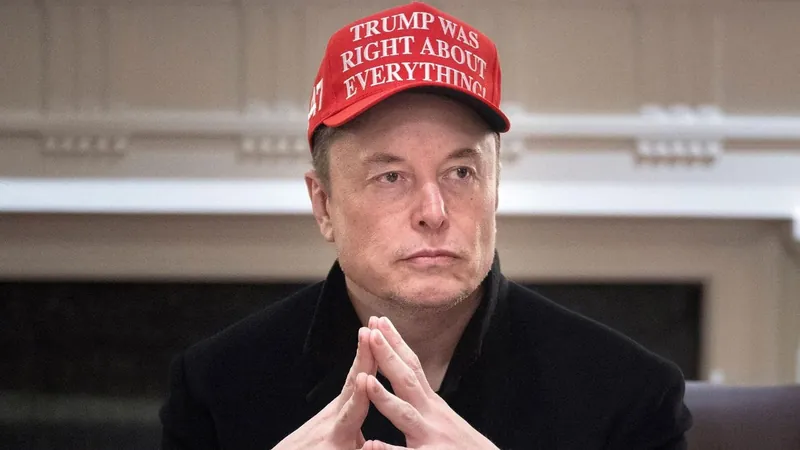
Hong Kong: China's Gateway to Global Markets Amid Challenges
2024-12-05
Author: Lok
Hong Kong's Global Financial Role Reaffirmed
In a significant reaffirmation of Hong Kong’s importance in the global financial landscape, top Chinese officials gathered at the Hong Kong Monetary Authority's investment summit on November 19. Vice Premier He Lifeng emphasized Hong Kong's pivotal role as a bridge for mainland companies seeking to tap into international markets.
Investment Summit Highlights
The three-day summit attracted some of the world’s leading bank executives, including representatives from Goldman Sachs, Morgan Stanley, and UBS, along with influential private investors such as Capital Group and Apollo Global Management. This event marks the third edition of this summit, which serves as a platform for fostering ties between Western capital and China's economic ambitions.
Initiatives to Enhance Hong Kong's Status
In a keynote address, He Lifeng highlighted several initiatives to enhance Hong Kong's status, including support for increased public listings and sovereign bond issuances in the city. He stressed the necessity of attracting more Chinese financial institutions to establish a presence in Hong Kong, thereby solidifying its role in enhancing the digital economy and establishing family offices.
Hong Kong and the Belt and Road Initiative
Moreover, Hong Kong is seen as a crucial conduit for channeling investments into China’s ambitious Belt and Road Initiative, a massive infrastructure project aimed at fostering global trade connectivity. The officials also underscored the need for Hong Kong to more accurately represent China's economic development, with calls for greater participation from Chinese companies.
Signs of Market Rejuvenation
Despite facing three years of stock market struggles, signs of rejuvenation are emerging in Hong Kong’s capital markets, evidenced by a surge in IPOs during the first three quarters of this year compared to the previous year. The benchmark Hang Seng Index has also shown resilience, buoyed by recent stimulus measures from mainland authorities. However, concerns linger regarding the potential impact of a possible Donald Trump presidency on China’s economic future, creating uncertainty among investors.
Commitment to Offshore Activities
Li Yunze, a key figure from China's National Financial Regulatory Administration, reiterated the commitment to fostering offshore activities in Hong Kong, specifically encouraging Chinese banks and insurance firms to establish their headquarters there. He noted that the government promotes the issuance of bonds in Hong Kong, aiming to further develop the city into a major hub for gold trading.
Investor Sentiments and Concerns
While the atmosphere at the summit was largely optimistic, some Western investors expressed hesitation, opting for a 'wait-and-see' approach before committing new capital to China. They acknowledged the value of the insights shared by Chinese regulators but suggested that a more relaxed approach would foster deeper understanding and engagement.
Capital Repatriation and Transparency
Goldman Sachs' CEO David Solomon highlighted ongoing concerns about capital repatriation, noting that many global investors remain on the sidelines due to the complexities involved in doing business in China. Following suit, Morgan Stanley's Ted Pick emphasized that transparency is crucial for restoring consumer confidence, which is vital for economic recovery.
Political Climate and Future Prospects
Amid the summit, the backdrop of political unrest in Hong Kong resonated with attendees as the city witnessed significant court rulings against democracy activists, leading to calls for a boycott from some rights groups. The contrasting narratives of financial opportunity and political strife served as a poignant reminder of the tensions surrounding Hong Kong's future as a global financial hub.
Conclusion
As Hong Kong navigates its path forward, it will be essential to balance its ambitions as a financial conduit for China with the socio-political realities shaping its landscape.

 Brasil (PT)
Brasil (PT)
 Canada (EN)
Canada (EN)
 Chile (ES)
Chile (ES)
 Česko (CS)
Česko (CS)
 대한민국 (KO)
대한민국 (KO)
 España (ES)
España (ES)
 France (FR)
France (FR)
 Hong Kong (EN)
Hong Kong (EN)
 Italia (IT)
Italia (IT)
 日本 (JA)
日本 (JA)
 Magyarország (HU)
Magyarország (HU)
 Norge (NO)
Norge (NO)
 Polska (PL)
Polska (PL)
 Schweiz (DE)
Schweiz (DE)
 Singapore (EN)
Singapore (EN)
 Sverige (SV)
Sverige (SV)
 Suomi (FI)
Suomi (FI)
 Türkiye (TR)
Türkiye (TR)
 الإمارات العربية المتحدة (AR)
الإمارات العربية المتحدة (AR)